MIT Lesson 28A Kanji: 第28A課の漢字
 Warning!
There is Japanese text on this page. If it looks like this: $BI4@i
instead of this: "
Warning!
There is Japanese text on this page. If it looks like this: $BI4@i
instead of this: " ", then read this.
", then read this.
 Athena users - for instructions on how to
print this page, read
this.
Athena users - for instructions on how to
print this page, read
this.
In the following definitions, on (Chinese-based) readings
are represented by katakana, and by capital romaji letters; kun
(native Japanese-based) readings are represented by hiragana, and by
lower-case romaji letters. This is a common dictionary convention, and
does not have any bearing on meaning.
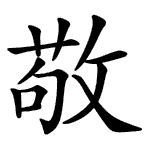
Printed form:
敬
Readings:
ケイ
うやま(う)
Meaning:
respect, honor
- Usage Examples:
- 敬語
お年寄りを敬う
敬具(けいぐ) Yours truly
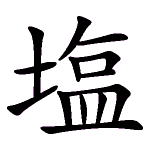
- Printed form:
- 塩
-
- Readings:
- エン
しお
- Meaning:
- salt
-
- Usage Examples:
- 塩辛い(しおからい)
塩分(えんぶん)が多い high salt
content
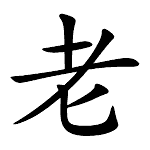
- Printed form:
- 老
- Readings:
- ロウ
お(いる)
- Meaning:
- old, aged
- Usage Examples:
- 老人(ろうじん) old people
敬老の日 respect for the aged day (holiday)
老いる
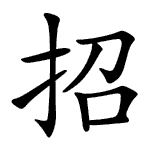
Printed form:
招
- Readings:
- ショウ
まね(く)
- Meaning:
- to invite
- Usage Examples:
- 招待する(しょうたい) to invite
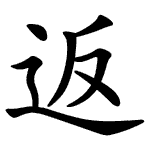
- Printed form:
- 返
- Readings:
- ヘン
かえ(す)
かえ(る)
- Meaning:
- to return
- Usage Examples:
- 返事をする
メールの返信(へんしん)
本を返す
返金(へんきん) repayment
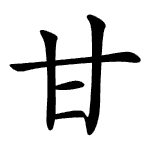
- Printed form:
- 甘
- Readings:
- カン
あま(える)
あま(い)
- Meaning:
- sweet, indulgent
- Usage Examples:
- 子どもに甘い親
甘口(あまくち)のワイン
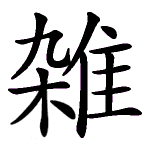
- Printed form:
- 雑
- Readings:
- ザツ
ゾウ
- Meaning:
- micellaneous, various
- Usage Examples:
- 雑学
混雑(こんざつ)する
雑用(ざつよう) micellaneous business
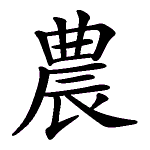
- Printed form:
- 農
- Readings:
- ノウ
- Meaning:
- agriculture, farming
- Usage Examples:
- 農業 (のうぎょう)
agriculture
農村(のうそん)
農家(のうか) farmer
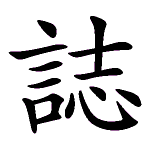
- Printed form:
- 誌
- Readings:
- シ
- Meaning:
- magazine, periodical
- Usage Examples:
- 雑誌
週刊誌 (しゅうかんし) weekly magazine
タイム誌
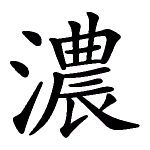
- Printed form:
- 濃
- Readings:
- ノウ
こ(い)
- Meaning:
- thick, concentrated, dense
- Usage Examples:
- 味が濃い
濃厚なスープ
濃度(のうど) density
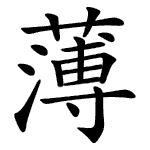
- Printed form:
- 薄
- Readings:
- ハク
うす(い)
- Meaning:
- thin, light
- Usage Examples:
- 薄いコーヒー
色が薄い
薄い紙を使う
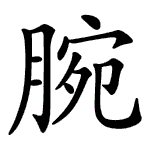
- Printed form:
- 腕
- Readings:
- ワン
うで
- Meaning:
- arm
- Usage Examples:
- 腕が痛い
腕力(わんりょく)がない
腕がいい skilled
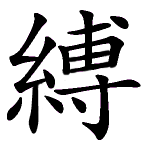
- Printed form:
- 縛
- Readings:
- バク
しば(る)
- Meaning:
- to bind, to restrain
- Usage Examples:
- ひもで縛る
自由を束縛する(そくばく) to restrain
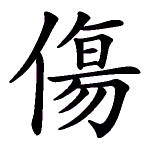
- Printed form:
- 傷
- Readings:
- ショウ
きず
いた(む)
- Meaning:
- to injure, to hurt, to damage
- Usage Examples:
- まだ傷が痛い
トマトが傷んだ
傷付いた to be wounded, to be (emotionally) hurt
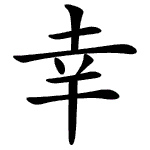
- Printed form:
- 幸
- Readings:
- コウ
しあわ(せ)
- さち
さいわ(い)
- Meaning:
- happiness, good luck
- Usage Examples:
- 幸せって何だろう?
- お幸せに! Be
Happy!
- 幸運(こううん)な人
- 不幸 (ふこう)な人
misfortunate person
- 幸いに(さいわ)いに
fortunately
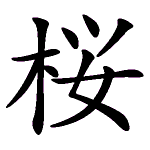
- Printed form:
- 桜
- Readings:
- オウ
さくら
- Meaning:
- cherry blossoms
- Usage Examples:
- 桜の季節
桜色のセーター
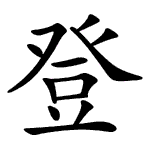
- Printed form:
- 登
- Readings:
- ト
のぼ(る)
- Meaning:
- to go up, to ascend, to register
- Usage Examples:
- 登る
登山 (とざん)
登校(とうこう)する to attend school
登録(とうろく)する to register
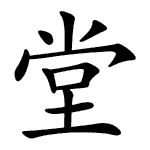
- Printed form:
- 堂
- Readings:
- ドウ
- Meaning:
- hall
- Usage Examples:
- 食堂
- 公会堂(こうかいどう) town hall
[Japanese
6 Kanji] [Japanese
6]
![]() Warning!
There is Japanese text on this page. If it looks like this: $BI4@i
instead of this: "
Warning!
There is Japanese text on this page. If it looks like this: $BI4@i
instead of this: "![]() ", then read this.
", then read this.![]() Athena users - for instructions on how to
print this page, read
this.
Athena users - for instructions on how to
print this page, read
this.
















